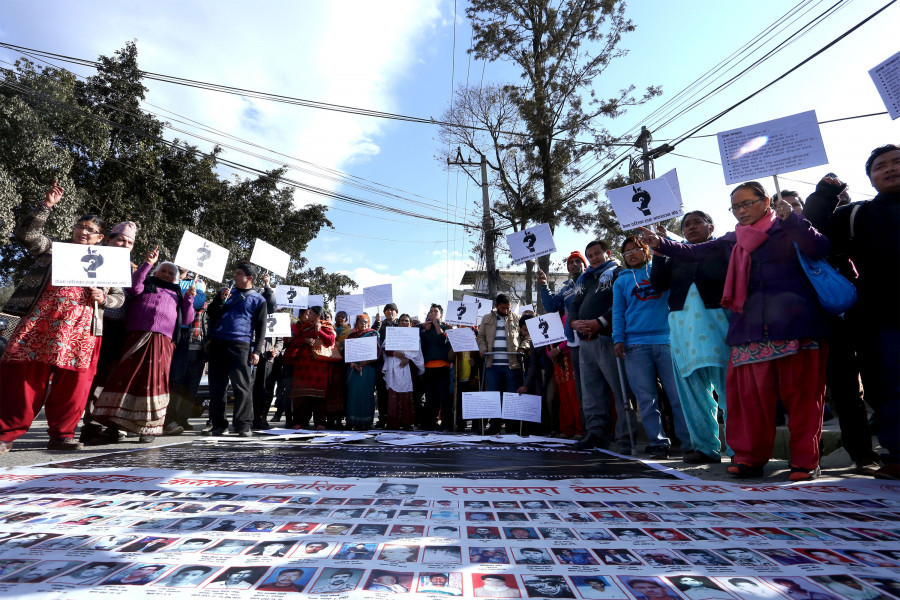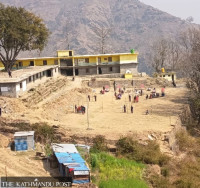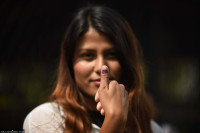National
Political instability an excuse to delay justice, conflict victims say
Leaderships of major political parties have refused to sit for a meeting with the victims.
Binod Ghimire
For months now, the victims of decade-long Maoist insurgency have been requesting the leaderships of major political parties, including Prime Minister KP Sharma Oli, to sit in a meeting with them and listen to their grievances.
None of the leaders has agreed till date, citing busy schedules due to political instability in the country.
Dissatisfied with the non-performance of the two transitional justice commissions and delay in amendment to transitional justice law, the conflict victims want to keep their concerns before the country’s political leaders.
“The Covid-19 was an excuse to sideline our concerns earlier. Now it is the political instability,” Gopal Shah, chairperson of the Conflict Victims’ National Network, told the Post. “They have time for everything, except for holding talks with the conflict victims.”
Shah said they had approached Prime Minister Oli and former prime ministers Madhav Kumar Nepal of CPN-UML, Sher Bahadur Deuba of Nepali Congress and Pushpa Kamal Dahal of CPN (Maoist Centre), and every single one of them turned down their request for a meeting.
The government extended the terms of the two transitional justice bodies—the Commission of Investigation on Enforced Disappeared Persons and the Truth and Reconciliation Commission—in the first week of February. At the time, the conflict victims had expected that the government would also revise the Enforced Disappearances Enquiry, Truth and Reconciliation Act -2014 in line with the 2015 Supreme Court order. That expectation has yet to come to pass.
In 2015, the Supreme Court had directed the government to amend the Act, saying it did not adhere to international principles of transitional justice. The current Act offers amnesty even in serious cases of human rights violations. The court had ruled that convicts in cases related to rape, extrajudicial killing, enforced disappearance and torture cannot be granted amnesty.
The conflict victims are growing impatient by the apparent unwillingness of the government and the political parties to implement the Supreme Court’s order.
“When it comes to the concerns of the conflict victims, the political parties have a common stand. They want to delay, dilute and deny justice to us and protect the people who committed unspeakable crimes and human rights violations,” said Suman Adhikari.
Adhikari’s father, Muktinath, a school teacher, was murdered by the Maoist insurgents in Lamjung in 2002.
“The chairpersons and members of the two transitional justice commissions were picked on party quotas. They will always do the bidding of the parties that nominated them to their posts,” added Adhikari.
The incumbent teams of the two commissions were appointed on January 18 last year. Ganesh Datta Bhatta was appointed the chairperson of the Truth and Reconciliation Commission on the Nepali Congress quota. Likewise, Yubraj Subedi was appointed the chairperson of the Commission of Investigation on Enforced Disappeared Persons on the then Communist Party of Nepal quota.
In the last six years since its formation, the truth commission has received 63,718 complaints on conflict-era crimes and completed a preliminary investigation that involved recording of statements from around 4,000 of the complainants.
The disappearance commission, meanwhile, has received 3,223 complaints from family members whose loved ones were disappeared during the conflict. Of the total registered complaints, the commission has picked 2,506 cases as valid ones and completed the preliminary investigation process.
More than 13,000 people were killed and 1,333 others were disappeared during the Maoist conflict.
Officials of the transitional justice commissions say while they may not have performed to the expectation of the conflict victims, they have been putting every effort to accomplish the task assigned to them.
Sunil Ranjan Singh, a member of the disappearance commission, said they have started providing identity cards to the victims and set up a team of forensic and legal experts to exhume the bodies of the victims of enforced disappearances, if there are any.
“We are working to the extent we can,” he told the Post. “Let’s see what we can achieve by the time our tenure completes in July.”
The conflict victims, however, say issuing identity cards makes no sense unless they offer some state benefits to them.
“The commissions are distributing identity cards just to show that they are doing something,” said Maina Karki, chairperson of the Conflict Victims’ Common Platform, says.
The commissions have recommended that the government provide health and education subsidies and government job reservations, among others, to the card holders. But no decision has been made so far.
Human rights experts say political parties and successive governments were never interested in completing the transitional justice process.
“The Covid-19 and political instability has become good excuses for the political parties while the commissions are pointing at the unfavourable conditions to cover up their weakness,” Govind Sharma Paudyal, a former member of the National Human Rights Commission, said. “The transitional justice process won’t move forward without amending the Act and taking the victims into confidence.”




 27.41°C Kathmandu
27.41°C Kathmandu














